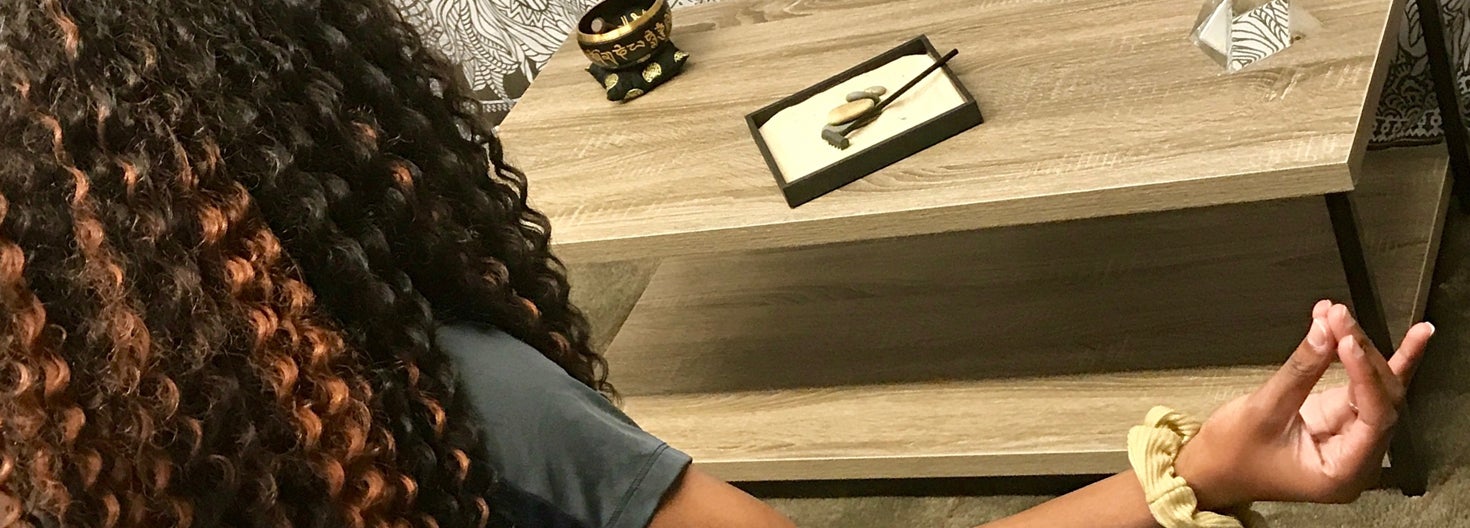
Justine Mirek ’19 is busy. Nail-biting, stomach-churning, tic-inducing, insomnia-provoking busy. The kind of busy fueled by chips and cookies chased with supersized cups of coffee or Red Bull.
Mirek’s final two weeks of the semester include exams, projects, a presentation, a portfolio review, internship responsibilities, preparations for studying abroad in Australia next semester and a search for a summer job. And yet the public relations and film major looks calm, serene even.
“This is my stressful week,” Mirek says. “But I usually plan out my studying or plan out time to complete assignments. Knowing I’ve set time aside to do the work alleviates the stress.”
Mirek is involved in planning Campus Recreation’s “Stress Less Week,” happening through December 21 at the Anna Fascitelli Fitness and Wellness Center. Events planned include making your own stress ball, a pound-it-out exercise class and sound healing. Fascitelli’s Wellness Resource Center offers self-guided meditation, zen board painting and meditative coloring.
For students who feel they can’t carve out time from studying to take advantage of Stress Less Week, campus experts offer their advice to beat back stress.
Take water into exams
Hydration is critical, said Professor Kathleen Melanson, who teaches general and sports nutrition in the Nutrition and Food Sciences department. “One of the first symptoms of dehydration is fatigue, so reaching for coffee is a bad idea.” Try green tea or seltzer flavored with fruit.
Eat vegetables
Fatigue from sleep deprivation can trigger increased ghrelin production, a hormone that triggers feelings of hunger, which can drive a person to eat more foods higher in sugar and fat. A diet rich in less-processed, less-refined foods can make a big difference, Melanson said.
Get over FOMO
Students should get 8-to-9 hours of sleep a night. The average college student is getting about 6-to-7 hours. One less hour a night means losing a night’s sleep a week. Sleep habits of first-year students tend to be the worst. They try to manage new schedules and maintain old friendships late into the evening, said Sue K. Adams, associate professor and program director of URI’s Human Development and Family Studies Department. And students’ sleep is often interrupted by devices.
And then there’s FOMO, shorthand for Fear of Missing Out, which is now being studied by psychologists. Students are loathe to be the first to sleep for fear of missing something, Adams said.
Adams said plan for sleep. “Tell people ‘I’m going to bed now.’ Set a time after which you’re done with your phone and go to bed when you’re tired,” Adams said. “And realize you have to go to bed when you’re tired.”
Breathe, then move
Buddhist Geshe Thupten Tendar of URI’s Center for Nonviolence and Peace Studies counsels students to assess their feelings when stressed. Then, sit in a comfortable position, take three deep breaths, and stretch to loosen the body. A simple activity such as singing a song or taking a walk can also help, Tendar said.
“People thought that with tech, wealth, opportunity and education all problems would be taken care of but people are still experiencing suffering,” Tendar said. “Focus on the mind rather than a solution outside.”
